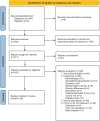Metabolic Syndrome: An Updated Review on Diagnosis and Treatment for Primary Care Clinicians
- PMID: 39714021
- PMCID: PMC11672556
- DOI: 10.1177/21501319241309168
Metabolic Syndrome: An Updated Review on Diagnosis and Treatment for Primary Care Clinicians
Abstract
Objective: Metabolic syndrome is a cluster of cardiovascular risk factors (central obesity, hypertension, dyslipidemia, and insulin resistance) that affects between 12.5% and 31.4% of adults worldwide. It correlates with increased risks of cardiovascular disease, diabetes, cancer, and overall mortality in a dose-dependent fashion. This review aims to provide primary care clinicians an updated review of the evidence on metabolic syndrome, with a focus on treatment.
Design: Scoping evidence review.
Eligibility criteria: English-language studies of evidence Level I or II that focused on defining, diagnosing, and treating metabolic syndrome or its components.
Information sources: PubMed and Cochrane Database of Systematic Reviews.
Results: Though evidence is still lacking for improved outcomes with treating the syndrome per se, addressing its individual components reduces risks. Lifestyle changes like weight loss and increased physical activity are first line. Surgical options assist with weight loss for certain patients. Pharmacotherapies like glucagon-like peptide-1 receptor agonists, sodium-glucose cotransporter-2 inhibitors, statins, and antihypertensives also have efficacy.
Conclusions: Metabolic syndrome is an independent risk factor for many poor health outcomes. Its individual components should be treated with medication and behavioral changes to reduce cardiovascular risk and prevent diabetes and its complications. More research is needed on how to treat the syndrome itself. A diagnosis of metabolic syndrome may be useful for motivating patients toward lifestyle changes, though more research is needed on how to treat the syndrome versus its components.
Keywords: chronic disease; metabolic syndrome; preventive medicine; risk reduction behavior.
Conflict of interest statement
Declaration of Conflicting InterestsThe author(s) declared no potential conflicts of interest with respect to the research, authorship, and/or publication of this article.
Figures
Similar articles
-
The pharmacological management of metabolic syndrome.Expert Rev Clin Pharmacol. 2018 Apr;11(4):397-410. doi: 10.1080/17512433.2018.1429910. Epub 2018 Jan 31. Expert Rev Clin Pharmacol. 2018. PMID: 29345505 Review.
-
Effect of a Lifestyle Intervention Program With Energy-Restricted Mediterranean Diet and Exercise on Weight Loss and Cardiovascular Risk Factors: One-Year Results of the PREDIMED-Plus Trial.Diabetes Care. 2019 May;42(5):777-788. doi: 10.2337/dc18-0836. Epub 2018 Nov 2. Diabetes Care. 2019. PMID: 30389673 Clinical Trial.
-
Epidemiology of the insulin resistance syndrome.Curr Diab Rep. 2003 Feb;3(1):73-9. doi: 10.1007/s11892-003-0057-2. Curr Diab Rep. 2003. PMID: 12643149 Review.
-
The effect of weight management interventions that include a diet component on weight-related outcomes in pregnant and postpartum women: a systematic review protocol.JBI Database System Rev Implement Rep. 2015 Jan;13(1):88-98. doi: 10.11124/jbisrir-2015-1812. JBI Database System Rev Implement Rep. 2015. PMID: 26447010
-
Drug treatment of metabolic syndrome.Curr Clin Pharmacol. 2013 Aug;8(3):224-31. doi: 10.2174/1574884711308030009. Curr Clin Pharmacol. 2013. PMID: 22950955 Review.
Cited by
-
Shared Mechanisms Between Osteoarthritis and Cardiovascular Disease: A Clinical and Pathophysiological Review.Cureus. 2025 Jun 18;17(6):e86284. doi: 10.7759/cureus.86284. eCollection 2025 Jun. Cureus. 2025. PMID: 40688840 Free PMC article. Review.
-
Recovery of Patient-Reported Outcome Measures vs Gait Parameters Obtained by Instrumented Insoles After Tibial and Malleolar Fractures: Prospective Longitudinal Observational Study.JMIR Mhealth Uhealth. 2025 Jun 16;13:e71022. doi: 10.2196/71022. JMIR Mhealth Uhealth. 2025. PMID: 40523278 Free PMC article.
-
The unique relationship between body mass index and metabolic syndrome in AIDS patients.Sci Rep. 2025 Apr 22;15(1):13915. doi: 10.1038/s41598-025-97033-z. Sci Rep. 2025. PMID: 40263359 Free PMC article.
References
Publication types
MeSH terms
LinkOut - more resources
Full Text Sources
Medical


